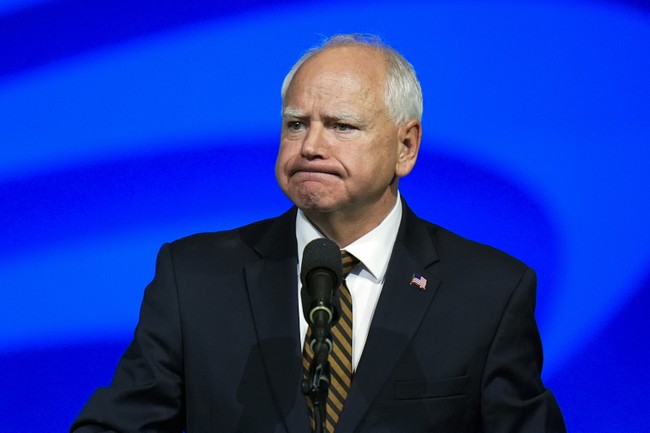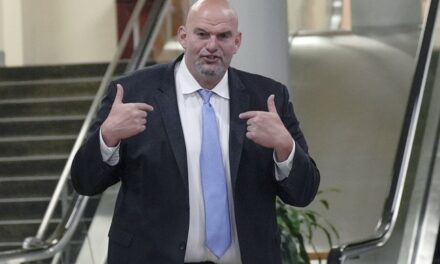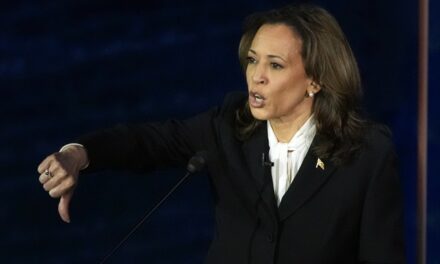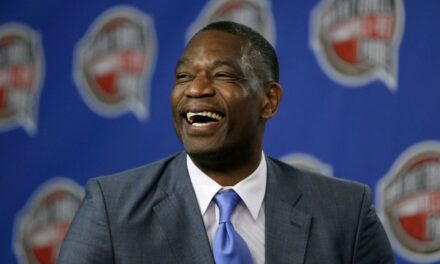We support our Publishers and Content Creators. You can view this story on their website by CLICKING HERE.

Don’t pay attention to the next-day polling data on the VP debate. It doesn’t matter whatsoever. Sure, it’s all you’ll hear over the next 48 hours, but try to tune it out.
Advertisement
There are two common ways to evaluate debates. The first is favored by the mainstream media: break down every Q&A, tell your audience who “won” each encounter, score the moments that evoked positive/negative reactions, and then ask the audience who they liked the most.
This is the Frank Luntz approach: take a studio audience, attach ‘em to a dial, and highlight the moments where the dial was moved up or down. Then, whichever candidate got the most “clicks” is declared the winner by Luntz.
It’s good TV because it’s highly demonstrative and emotionally malleable: you get to replay all the emotionally charged soundbites and spin to your heart’s content. It becomes a feature story masquerading as a news story — and feature stories are more fun to produce.
Journalists tend to favor feature stories because they allow for more creativity.
Here’s a sneak peek behind the velvet ropes of the mainstream media: hard news is fricking boring. (A lot of work, too. Tons of research and tedious fact-checking — that’s no fun!) It’s something you pawn off on underlings. After you’ve paid your dues, that’s when you’re (finally!) allowed to delve into features. Furthermore, if you’re a journalist who fancies himself a (soon-to-be) great American writer, feature writing lets you strut your wares and pretend you’re Hemingway, even if only for a little while.
Advertisement
So that’s what the media will try to do: present the debate as a give-and-take prizefight, critique each individual moment, and then “score” the fight for the viewers (hrough the prism of their own biases, of course).
But it’s probably the worst way to evaluate a debate.
If Election Day was 24 hours after a debate, then the Luntz approach might have some merit. In such an instance, your next-day reaction would be relevant. But we’re still more than a month away from November 5!
What matters is how you’ll feel then — and NOT how you feel now!
When we remember something (or someone), we don’t recall it in its totality. Our memories don’t work like computers, capturing everything and storing all the data. Instead, we tend to focus on the few elements that attracted our attention, and then we build our own narrative around them.
The memories in your head are the byproduct of your own “feature writing.” Your most cherished memories aren’t hard news; they’re a rich tapestry of emotional storytelling, where YOU are the main character and ultimate arbiter of fact versus fiction. Within our skulls, we’re all feature writers.
Most politicians suck at marketing because they don’t understand how people actually think. If you fail to align your marketing message with how people process information, then your marketing message will fail. All you’re doing is marketing to yourself. And that’s probably the biggest mistake in marketing today. Always remember: It’s not about you; it’s about your audience.
Advertisement
So what will the long-term takeaways from the VP debate be?
The first takeaway is that JD Vance is a smart, good-looking guy with a nice beard and soft baby blues; he’s reasonable and grounded; and it reflects positively on Trump that he’d pick someone like him. Even when the moderators tried to gang up on Vance, he rocked his political jiu-jitsu and flipped ‘em on the mat, using their own momentum against them.
That’s all positive for Team MAGA. (It probably won’t move the needle much, since Trump’s brand has minimal elasticity, but it’s still a win for the GOP.)
The second takeaway is that Tim Walz isn’t ready for primetime.
If you’re a hardcore Democrat, Walz didn’t do anything that would dissuade you from supporting Harris, but if you were on the fence, he certainly didn’t win you over. His facial expressions were just flat-out odd — like he was mugging the camera, auditioning for the part of a dopey 1988 sitcom Dad. He came across as a small-town mayor trying to play the part of a president, and it just wasn’t within his skill set.
- He’s not someone you’d want answering the phone at 3 a.m.
- It’s almost like he’s cosplaying as a liberal’s interpretation of a conservative.
- He’s not particularly smooth, clever, glib, witty, or compassionate.
- Walz is boring. Not only is he white, he’s completely colorless.
- His “knucklehead” explanation for lying about China will raise more red flags — and I’m not just talking about the national flag of China. This is on the cusp of blowing up in a big way.
- His baffled/constipated expression during split screens will be fodder for memes ‘til the end of time.
- And if you’re gonna flub a line, good Lord, flubbing a line about befriending school shooters is about as bad as it gets!
Advertisement
Related: What Pro Wrestling Can Teach Us About Politics
Last night was a victory for Trump: The Great Walz of China was overaged, underprepared, and full of cracks. But don’t expect the mainstream media to report it that way. They won’t.
Instead, you’ll probably have to wait ‘til Nov. 6 to read about it.

 Conservative
Conservative  Search
Search Trending
Trending Current News
Current News 







